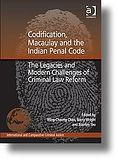Codification, Macaulay and the Indian Penal Code
Chan, Wing-Cheong [u.a.] [Hrsg.]:
Codification, Macaulay and the Indian Penal Code : the legacies and modern challenges of criminal law reform / edited by Wing-Cheong Chan, Barry Wright, Stanley Yeo. - Farnham : Ashgate, 2011. - 379 S. - (International and comparative criminal justice)
ISBN 978-1-4094-2442-0
£ 75,00
DDC: 345
Beschreibung
Enacted in 1860, the Indian Penal Code is the longest serving and one of the most influential criminal codes in the common law world. This book commemorates its one hundred and fiftieth anniversary and honours the law reform legacy of Thomas Macaulay, the principal drafter of the Code. The book comprises chapters which examine the general principles of criminal responsibility from the perspective of Macaulay, and from more recent accounts by lawmakers and reformers. These are framed by chapters that examine the history and conceptual underpinnings of Macaulay's Code, consider the need to revitalize the Indian Penal Code, and review the current challenges of principled criminal law reform and codification.
This book is a valuable reference on the Indian Penal Code, and current debates about general principles of criminal law for legal academics, judges, legal practitioners and criminal law reformers. It also promises to have wider scholarly appeal, of interest to legal theorists, historians and policy specialists. [Verlagsinformation]
Herausgeber
WING-CHEONG CHAN is an associate professor of law and Amaladass Fellow for Criminal Law at the National University of Singapore. He specialises in criminal law and family law, and has written extensively in these areas. He is co-author (with Neil Morgan and Stanley Yeo) of Criminal Law in Malaysia and Singapore (LexisNexis, 2007), and has edited two books on criminal law: Fundamental Principles of Criminal Law: Cases and Materials (LexisNexis, 2005); and Support for Victims of Crime in Asia (Routledge, 2007). Profile page.
BARRY WRIGHT is a professor of law, history, and criminology at Carleton University, Canada. He specializes in legal history, criminal and constitutional law, and legal and political theory. He has published widely on colonial legal history, focusing on Canadian and Australian comparisons, and is editor of a multi-volume collaborative project, Canadian State Trials, that examines political trials and the administration of national security measures in Canadian history (University of Toronto Press-Volume One, 1608-1837 published 1996; Volume Two, 1837-39 published 2002; Volume Three, 1840-1914 published 2009). He is co-author (with Patrick Fitzgerald and Vincent Kazmierski) of Looking at Law: Canada's Legal System 6th edition (LexisNexis-Butterworths, 2010). Profile page.
STANLEY YEO is a professor of law at the National University of Singapore. He is an internationally renowned comparative law scholar who has studied the criminal laws of various jurisdictions for more than twenty years. He has authored several books on criminal law including Criminal Law in Malaysia and Singapore (with Wing-Cheong Chan and Neil Morgan); Fault in Homicide (Federation Press, 1996 - a treatise on culpable homicide in Australia, England and India); and Unrestrained Killings and the Law (Oxford University Press, Delhi, 1998 - a treatise on provocation and exceeding private defence in Australia, England and India). He has also been a regular contributor of articles to the Journal of the Indian Law Institute, the premier Indian legal journal. Profile page.
Quellen: Ashgate; WorldCat; Amazon (UK); Google Books
Ähnlich
- Purohit: The Aga Khan Case
- Llewellyn-Jones: Last King in India
- Sohi: Echoes of Mutiny
- Fischer-Tiné: Shyamji Krishnavarma
- Biedermann: The Portuguese in Sri Lanka and South India
- Cederlöf: Founding an Empire on India's North-Eastern Frontiers
- Agnani: Hating Empire Properly
- Chavan: Language Politics under Colonialism
- Ray: Under the Banyan Tree
- Hughes: Animal Kingdoms

